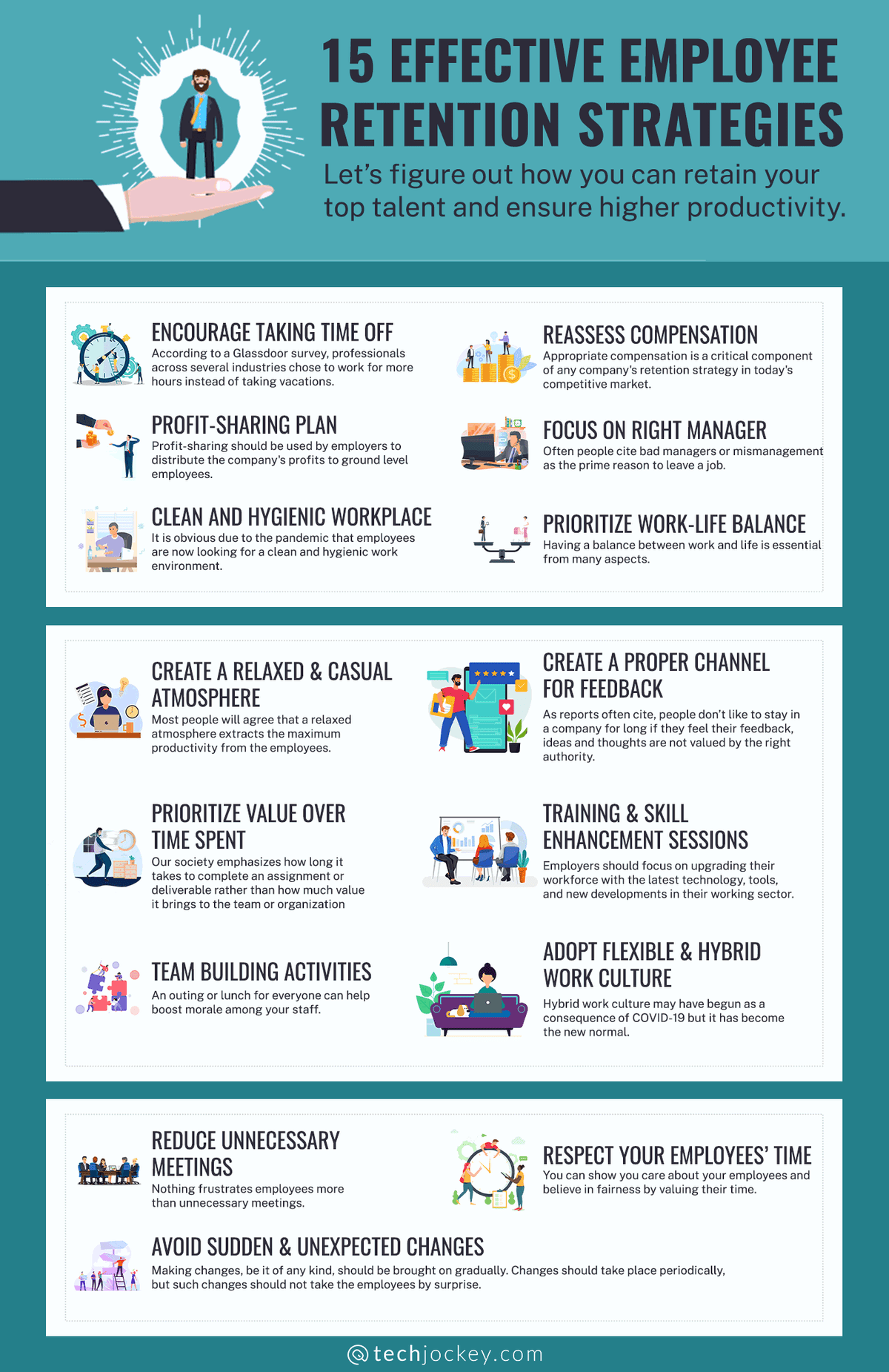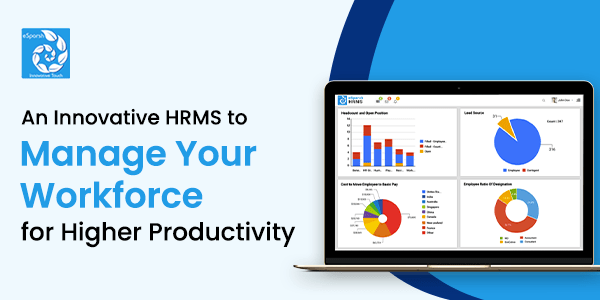15 Most Effective Employee Retention Strategies for Today’s Work Culture

Employee Retention is critical to any company, be it big or small. Since employees are the core strength of any organization, their turnover hampers the business and growth of the particular organization.
The so-called ‘Great Resignation’ is a burning example of growing employee dissent. Despite the hurdles of the pandemic, millions of people have resigned from their jobs, some of them were surprisingly well-established.
Most people speculate that the financial burden and pay cuts are the primary reason for mass action like the Great Resignation. However, popular reports have shown that low compensation is one of several key reasons employees leave an organization.
Companies should look into the matter as a grave situation instead of just searching for replacements. While they can replace the employee with an employee, replacing the inherent talent isn’t possible. And it is ultimately the talent that benefits a company.
That’s why companies need to work on their employee retention strategy rather than employee replacement strategy. In this article, we will talk about some effective employee retention strategies.
But before that, let’s understand what employee retention is and why is it important in today’s work culture?
Suggested Read: Top Tools for Managing Employee Attendance During Work From Home
What is Employee Retention?
In a nutshell, employee retention is an organization’s effort to retain its most valuable asset – its workers! If you want to stay in business for the long term, you must also be aware of your company’s employee turnover rate. Therefore, keeping key employees on board is critical to run the company smoothly in the long run.
Suggested Read: Be More Employee-Friendly with These Unique Leave Policies
Why Employee Retention Is Important?
When an employee leaves in between a business session or is discontinued abruptly, it disturbs the whole ecosystem, affecting all the people in the network. It’s not just a temporary disruption, it’s a costly one too.
Apart from the hefty cost of replacement, it also requires your entire team of HR professionals to get a new employee onboard. Moreover, any new joinee would require time to take after the previous employee.
However, the worst consequence of employee turnover is its impact on the remaining workforce. The Workload on the remaining workforce often increases when their coworkers leave. This can result in further departures besides leaving the employees frustrated. Such employees are less likely to perform at their best capacity, resulting in lower productivity and work output.
Now that you have understood what employee retention is and why it is necessary, let’s see some effective employee retention strategies for today’s work culture.
Suggested Read: How Employee Attendance Tracking App Helps Businesses Grow
15 Effective Employee Retention Strategies

- Encourage Taking Time Off
According to a Glassdoor survey, professionals across several industries chose to work for more hours instead of taking vacations. Such employees have reported increased stress and anxiety during COVID-19. Adding the domestic responsibilities leaves the employees in a tired and burned-out stage.
Such employees often deliver poor work performance. Hence, encourage them to take time off to recharge themselves. The top leadership should publicly encourage this trend while instructing the lower-level managers to follow it religiously.
- Reassess Compensation
Appropriate compensation is a critical component of any company’s retention strategy in today’s competitive market. Even if an employee believes they are highly valued, they are more likely to look for work elsewhere if they believe they are being underpaid.
Companies with transparent and easy-to-understand pay policies attract and retain a better workforce, thereby ensuring they are successful in the long run.
Moreover, compensating the performers besides their usual pay further encourages them to work harder and remain loyal to the company.
- Profit-sharing Plan
Profit-sharing should be used by employers to distribute the company’s profits to ground-level employees. This will not only motivate them but also make them feel more connected with the company. This strategy also prompts them to go the extra mile when needed.
- Focus on Right Manager
Often people cite bad managers or mismanagement as the prime reason to leave a job. When employees and managers don’t remain on good terms, neither the company nor the employees benefit from it. Hence, companies must ensure employees have the right managers who support their growth and advancement in the right manner.
- Clean and Hygienic Workplace
It is obvious due to the pandemic that employees are now looking for a clean and hygienic work environment. It instills a notion of wellbeing and safety. No matter what line of work you’re in, you need to make your workspace clean and comfortable. If your employees feel safe and secure in their work environment, they’ll be more productive and efficient.
- Prioritize Work-Life Balance
Having a balance between work and life is essential from many aspects. Firstly, it does not lead to a clash between an employee’s duties and responsibilities. Secondly, it helps employees keep the worries and stress of one segment away from the other. In both senses, employees perform better. Employees tend to choose companies that ensure this balance.
- Create A Relaxed & Casual Atmosphere
Most people will agree that a relaxed atmosphere extracts the maximum productivity from the employees. A chilled and relaxed environment gives comfort and confidence to the employees. This might look like an unusual employee retention strategy, but it is quite effective.
- Create A Proper Channel for Feedback
As reports often cite, people don’t like to stay in a company for long if they feel their feedback, ideas, and thoughts are not valued by the right authority.
Therefore, you should create proper channels where employees can provide feedback without hesitation. Sometimes speaking directly to the lower level employees greatly benefits the company. That’s a way employees feel valued in the organization, and their ideas can bring changes to the company.
- Prioritize Value Over Time Spent
Our society emphasizes how long it takes to complete an assignment or deliverable rather than how much value it brings to the team or organization. Hence, encourage your employees to work for value and not just to kill time. Focus on the quality of their work rather than the specific hours to complete it.
- Training & Skill Enhancement Sessions
Employers should focus on upgrading their workforce with the latest technology, tools, and new developments in their working sector. Conducting periodical training sessions helps permanent employees stay in the loop. Also, involve them in the discussion and get feedback about what training and skill enhancement can help them excel in the company.
- Team Building Activities
An outing or lunch for everyone can help boost morale among your staff. Similarly, other team-building efforts like games and activities help employees to get rid of work fatigue and stress. It’s a proven strategy for retaining employees. After all, everyone enjoys having a good time apart from feeling well treated.
- Adopt Flexible & Hybrid Work Culture
Hybrid work culture may have begun as a consequence of COVID-19 but it has become the new normal. A hybrid workplace allows employees to save time, money, and work from the safety of home. While employees will avoid absenteeism, companies can save costs on rent and infrastructure – a win-win situation for both. This option also lets employees have a better work-life balance while being accountable from home.
- Reduce Unnecessary Meetings
Nothing frustrates employees more than unnecessary meetings. Don’t have a meeting just for the sake of having it. Today, getting the job done is more important than wasting time on other things.
- Respect Your Employees’ Time
You can show you care about your employees and believe in fairness by valuing their time. Because remote workers don’t have to commute, don’t assume their office hours have been extended. For example, saying things like “since we have more time now” demonstrates a lack of awareness and respect for your employees’ time and may give the impression that you’re taking advantage of the situation.
- Avoid Sudden & Unexpected Changes
Making changes, be it of any kind, should be brought on gradually. Changes should take place periodically but such changes should not take the employees by surprise. Many employees are not comfortable with sudden and unexpected changes. Hence, you can better take a slow and formidable route to introduce new changes.

How Can eSparsh Software Help with Employee Retention?
Effective employee retention is a major benefit of eSparsh HR software. We have listed down a few of the modules that can help with retention of employees in an organization.
- Compensation and Benefits: This module includes wages, salaries, and other beneficiary features for employees like vacation time, employee stock ownership plans, etc. It helps retain talented employees to an organization.
- Employee Development: Giving employees professional development opportunities and trainings will not only help them grow but will also help you retain them. An employee tends to stay in an organization longer, where they see chances to upskill themselves.
- Employee Relationship Management (ERM): Another way employers can support retention effort is by ensuring consistent ERM efforts. ERM activities connect different team members and help build effective teams where employees discuss and contribute to new ideas and work & grow together as a team.
- Reward and Recognition: Receiving rewards and recognition at workplace motivates employees to work harder and makes them feel appreciated encouraging them to stay at a job for a long time.
- Smart Recruitment: Hiring the right employees is closely linked with employee retention. eSparsh’s recruiting process focuses on attracting employees who are the right fit for the open job, so that the employees stay for a longer time.
The bottom line:
An effective employee retention policy is necessary for cultivating a positive workplace culture. Remember that it is not a one-time activity. You have to go on reevaluating your strategy over the years. Especially, during times of major workplace changes, such as the COVID-19 pandemic, you have to be extra careful to not lose your best pool of talents.
We hope that the employee retention strategies mentioned above help you have a positive and productive workplace. Since employees are the core strength of any organization, prevent them from turning over to other organizations because of reasons which you can fix. After all, it’s the company that will suffer from the abrupt exit of employees in between a business session.
Suggested Read: Smart Tips for Employee Life Cycle Management with PeoplesHR
The Techjockey content team is a passionate group of writers and editors dedicated to helping businesses make informed software buying decisions. We have a deep understanding of the Indian software market and the challenges that businesses face when choosing the right software for their needs. We are committed... Read more






























